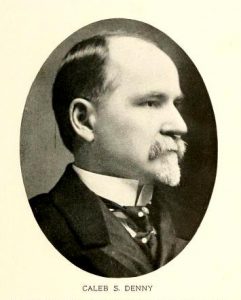
Photo info ...
Credit: Public domain via Find A GraveView Source
(May 13, 1850-Mar. 24, 1926). Denny’s father, born in Kentucky, was opposed to slavery, and so settled in Monroe County, Indiana, where Caleb, the youngest of 11 children, was born. The family moved to a farm near Boonville, Warrick County, in 1853, and then, upon his father’s death in 1861, to the town where Caleb was apprenticed to a tinsmith. He soon left his apprenticeship, attended graded schools in Boonville and Edwardsport, and entered Indiana Asbury (DePauw) University in 1866. Denny remained two years until, lacking funds, he returned to teach in Warrick County and began to read law.
Named assistant state librarian in 1870, he moved to Indianapolis (see the ). Continuing his studies with various lawyers, he was admitted to the local bar in 1872 and to state and federal courts in 1873. He was appointed assistant attorney general of Indiana, a new office (1873-1875), and then turned to the active practice of law. Elected city attorney in 1881 and reelected in 1884, Denny resigned in 1885 to wrest the nomination for mayor from the party’s incumbent and two other candidates.
Denny campaigned for a “strict enforcement of the laws” regarding Sunday closing, gambling, and prostitution. His 1885 victory was by a slim 60 votes from some 18,000 casts. His margin in 1887 was nearly 800. Denny did not run in 1889 but was persuaded to stand against a popular incumbent in 1892. He campaigned, as always, as the law-and-order candidate. His margin of victory, nearly 3,200 votes, the largest to that time, surprised the leaders of both parties.
Highlights of Denny’s two terms as mayor include several court battles and city benchmarks. In 1889, the Democratic General Assembly adopted two laws giving exclusive control of the public works of the city and the police and fire departments to boards appointed by the legislature. Mayor Denny fought this measure, and the Marion County Superior Court, and the state Supreme Court on appeal, agreed that the laws were unconstitutional.
During the Pullman Railroad Strike of 1894, centered in Chicago, Denny took charge as mandated by the city charter of 1891 (see ), spending much of the crisis at the central police station. Only one train was delayed and no property damage occurred. True to his reformist impulses, the mayor in a lawsuit successfully defended the section of the 1891 charter requiring the testing of all job applicants. Members of his own party had urged him to disregard the civil service provisions. The Denny years witnessed a test of asphalt street paving, abandonment of horse-and-mule cars for electric trolleys, and the introduction of natural gas for homes.
After 1895 Denny returned to his law practice but continued his public service; three terms as county attorney, 1905-1908; presidential elector for the 7th district, 1908; president of the trustees of the state normal school at Terre Haute after 1905; and secretary of the state pardon board, 1924 to his death. His son, , city controller, became mayor for two years upon the death of the incumbent in 1947, making the Dennys one of three father and son mayors in Indianapolis history

Help improve this entry
Contribute information, offer corrections, suggest images.
You can also recommend new entries related to this topic.